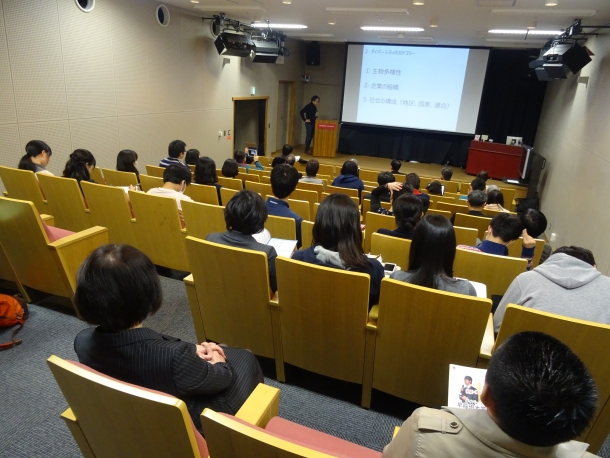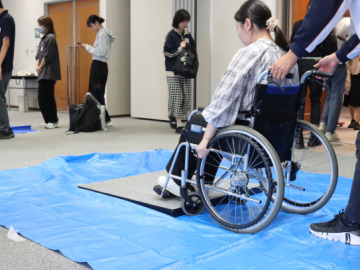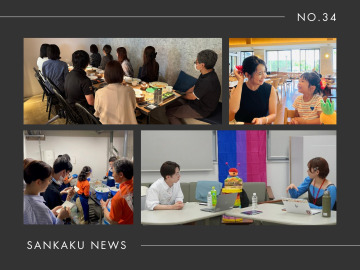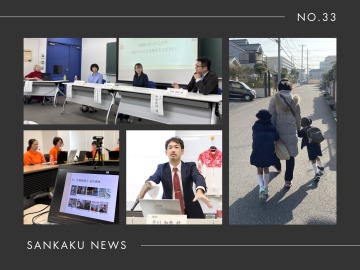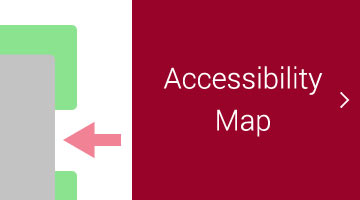On November 29, 2016, a symposium entitled “the Diversity Debate at Waseda University” was held in the Okuma Memorial Tower, with the goal of sharing and discussing the significance of and challenges surrounding the promotion of diversity at Waseda University.
Contents
- Opening speech: Vice President for Diversity Promotion, Keiko Hata (Professor, Faculty of Social Sciences)
- Keynote lecture 1: Challenges Surrounding Diversity at Waseda University Kazuo Kuroda (Professor, Faculty of International Research and Education)
Keynote lecture 2: Critique of Diversity Tatsuyuki Kamio (Professor, Faculty of Education and Integrated Arts and Sciences) - Questions and discussion
Commentator: Senior Executive Vice President of Waseda University, Shuji Hashimoto (Professor, Faculty of Science and Engineering)
Moderator: Director of the Office for Promotion of Equality and Diversity, Tetsuya Yaguchi (Professor, Faculty of Education and Integrated Arts and Sciences)
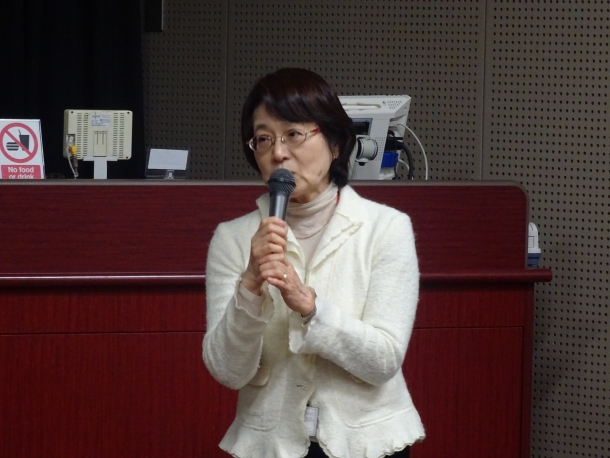 In her opening remarks, Keiko Hata, Vice President for Diversity Promotion, said: “One year has passed since the roundtable discussion last December, and this is our second opportunity to hold a public discussion. In the interim, we have been discussing what the aims and focus of diversity promotion at Waseda University ought to be. The Office for Promotion of Equality and Diversity, established in July 2016, is planning to advance various measures in close cooperation with the Student Diversity Center, which is to open next April. I believe that as we move forward, it is essential for us to convey as clearly as possible, both inside and outside of the university, just why we are promoting diversity. Based on the discussions we’ve had so far, we also need to make sure that every member of the University, as well as everyone in broader society who takes an interest in Waseda, can share these messages. I hope that all of you in attendance today will engage in a lively discussion and participate actively in this project in the future.”
In her opening remarks, Keiko Hata, Vice President for Diversity Promotion, said: “One year has passed since the roundtable discussion last December, and this is our second opportunity to hold a public discussion. In the interim, we have been discussing what the aims and focus of diversity promotion at Waseda University ought to be. The Office for Promotion of Equality and Diversity, established in July 2016, is planning to advance various measures in close cooperation with the Student Diversity Center, which is to open next April. I believe that as we move forward, it is essential for us to convey as clearly as possible, both inside and outside of the university, just why we are promoting diversity. Based on the discussions we’ve had so far, we also need to make sure that every member of the University, as well as everyone in broader society who takes an interest in Waseda, can share these messages. I hope that all of you in attendance today will engage in a lively discussion and participate actively in this project in the future.”
Keynote lecture 1: Challenges surrounding diversity at Waseda University (Professor Kazuo Kuroda)
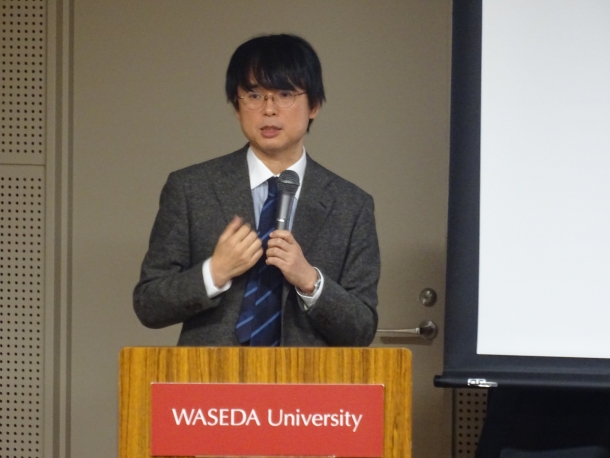 Next, Kazuo Kuroda, Professor of the Faculty of International Research and Education, delivered a keynote lecture. He spoke about the necessity of diversity at universities and what diversity brings to campuses, from the standpoint of his specialty, which is educational development in developing countries. Specifically, he stated that both the Universal Declaration of Human Rights and the 2030 Agenda for Sustainable Development (SDGs 2015-30) are aimed at leveling the playing field as regards opportunities for higher education; and that the UNESCO Salamanca Statement holds that inclusive education is an effective means to combat discriminatory attitudes. In this context, it is evident that diversity is a concept closely connected to equity. Meanwhile, the UNESCO World Declaration on Higher Education outlines the concept that universities promote diversity because of the positive effects of diversity on academic research and education. Professor Kuroda also stated that “diversity and inclusion,” an approach intended not only to ensure equity but also to enhance productivity and quality, can be a cornerstone for innovation and creation at universities. Diversity at Waseda, included in the Waseda Vision 150 and the Basic Guidelines on Support for Students with Disabilities of 2016, are key strategies to energize the University and enhance productivity. He emphasized that it is important not only to aim for internationalization and diversity, but also to consider what will follow after we achieve these goals; and how promoting diversity while carrying on Waseda’s educational traditions can contribute positively to the wider world.
Next, Kazuo Kuroda, Professor of the Faculty of International Research and Education, delivered a keynote lecture. He spoke about the necessity of diversity at universities and what diversity brings to campuses, from the standpoint of his specialty, which is educational development in developing countries. Specifically, he stated that both the Universal Declaration of Human Rights and the 2030 Agenda for Sustainable Development (SDGs 2015-30) are aimed at leveling the playing field as regards opportunities for higher education; and that the UNESCO Salamanca Statement holds that inclusive education is an effective means to combat discriminatory attitudes. In this context, it is evident that diversity is a concept closely connected to equity. Meanwhile, the UNESCO World Declaration on Higher Education outlines the concept that universities promote diversity because of the positive effects of diversity on academic research and education. Professor Kuroda also stated that “diversity and inclusion,” an approach intended not only to ensure equity but also to enhance productivity and quality, can be a cornerstone for innovation and creation at universities. Diversity at Waseda, included in the Waseda Vision 150 and the Basic Guidelines on Support for Students with Disabilities of 2016, are key strategies to energize the University and enhance productivity. He emphasized that it is important not only to aim for internationalization and diversity, but also to consider what will follow after we achieve these goals; and how promoting diversity while carrying on Waseda’s educational traditions can contribute positively to the wider world.
He proposed that, while maintaining a balance of the three Cs—competitiveness, cooperation, and contribution—we still need to clarify three core issues: 1. what we can reasonably hope to achieve, 2. the conflict between selectivity and diversity, and 3. affirmative action.
Keynote lecture 2: Critique of Diversity (Professor Tatsuyuki Kamio)
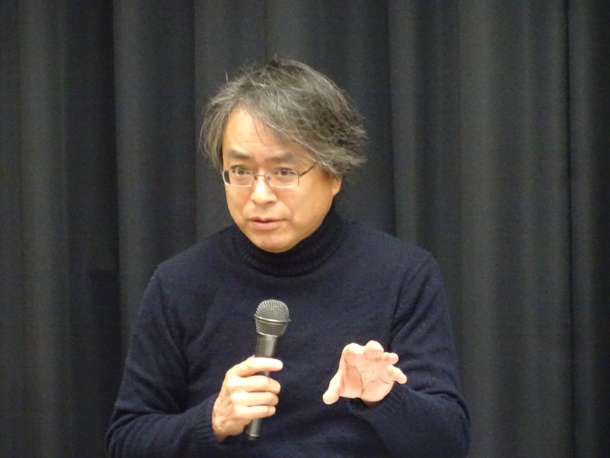 Tatsuyuki Kamio, Professor in the Faculty of Education and Integrated Arts and Sciences, gave the next keynote lecture. He began by saying that it was entitled “Critique of Diversity” not because he is in any way opposed to diversity, but because he felt it was crucial to define the scope of diversity from an objective standpoint by evaluating, judging, and studying it.
Tatsuyuki Kamio, Professor in the Faculty of Education and Integrated Arts and Sciences, gave the next keynote lecture. He began by saying that it was entitled “Critique of Diversity” not because he is in any way opposed to diversity, but because he felt it was crucial to define the scope of diversity from an objective standpoint by evaluating, judging, and studying it.
Professor Kamio shared his view that diversity covers gender, physical disability, nationality, religion, age, type of ability, level of ability, and sexual orientation. Next, he introduced three categories pertaining to the concept of diversity, present throughout history, which have been recognized as having positive ongoing effects in various fields since the late 1960s: (1) Biodiversity: the more diverse an ecosystem is, the more stable it is; (2) Diversity, both demographic and task-based, in corporate organizations: these two types of diversity have been shown to boost corporate competitiveness; and (3) Diverse social makeup (of regions, nations, and federations): this serves as a counterbalance against nationalism.
He suggested that when considering diversity in the context of university education, in addition to keeping in mind the two coexisting objectives of “humanism” and “broad-based improvement of productivity,” it is necessary to reaffirm Waseda University’s goals in promoting diversity and to clarify its means for doing so.
Questions and discussion
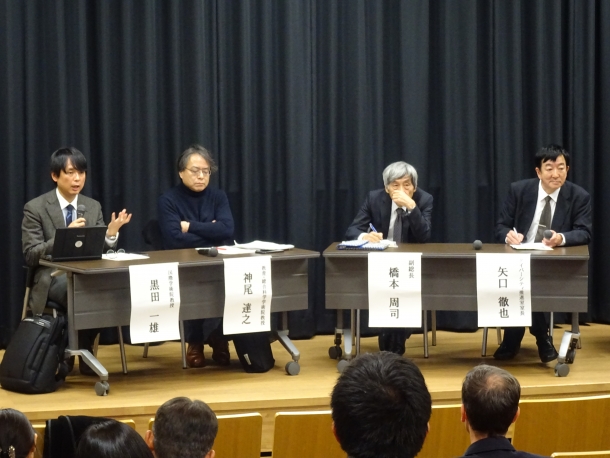 In the latter half of the program, time was allotted for questions from the audience and discussion, in order to engage in a more profound dialogue. During this section, the speakers delivered further messages as follows: diversity is not an obstacle to be overcome, but something positive that can benefit universities, societies, and people; we should look at diversity promotion in a positive light, rather than as a duty we are obliged to perform, by having a clear image of what diversity will bring in the near future; and that the promotion of diversity can be a strategy for growth.
In the latter half of the program, time was allotted for questions from the audience and discussion, in order to engage in a more profound dialogue. During this section, the speakers delivered further messages as follows: diversity is not an obstacle to be overcome, but something positive that can benefit universities, societies, and people; we should look at diversity promotion in a positive light, rather than as a duty we are obliged to perform, by having a clear image of what diversity will bring in the near future; and that the promotion of diversity can be a strategy for growth.
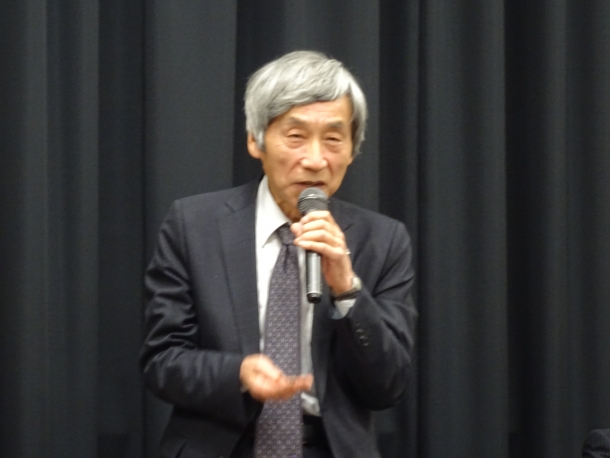 Commentator Shuji Hashimoto, Senior Executive Vice President of Waseda University, made the following observations: “Thus far diversity has been discussed from various vantage points, including race, religion, region of origin, gender, physical disabilities, mental illness, and LGBT issues, but there are other serious issues that call the fundamental nature of education into question, including discrimination relating to cognitive disorders and intellectual level. The presence of many different kinds of people benefits society as a whole, and I encourage students both to recognize and to positively appreciate these differences when interacting with one another. Despite various challenges, I believe it is a vital mission of universities to examine the concept of diversity beyond the confines of mere humanistic ideology. I look forward to working with everyone to promote diversity, using the reference points I have just outlined.”
Commentator Shuji Hashimoto, Senior Executive Vice President of Waseda University, made the following observations: “Thus far diversity has been discussed from various vantage points, including race, religion, region of origin, gender, physical disabilities, mental illness, and LGBT issues, but there are other serious issues that call the fundamental nature of education into question, including discrimination relating to cognitive disorders and intellectual level. The presence of many different kinds of people benefits society as a whole, and I encourage students both to recognize and to positively appreciate these differences when interacting with one another. Despite various challenges, I believe it is a vital mission of universities to examine the concept of diversity beyond the confines of mere humanistic ideology. I look forward to working with everyone to promote diversity, using the reference points I have just outlined.”
In closing, Tetsuya Yaguchi, Director of the Office for Promotion of Equality and Diversity, thanked the speakers and the audience, and asked for their cooperation in the future, saying, “We all need to reexamine Waseda University’s areas of focus in promoting diversity, and recognize that the process requires verification based on objective data. With this in mind, I hope to receive proactive opinions and cooperation from all of you.”
The symposium was a success, and elicited feedback from attendees such as the following: “I hope that an environment will be established in which every student is aware of the importance of diversity and harmonious coexistence, and that Waseda University’s efforts in this regard will spread and take root in Japanese society.” “I gained a clear understanding of the differing perspectives on promoting diversity for the cause of humanism, and of promoting it for heightened productivity.” “I learned a lot, and I hope more symposiums like this will be held in the future.”